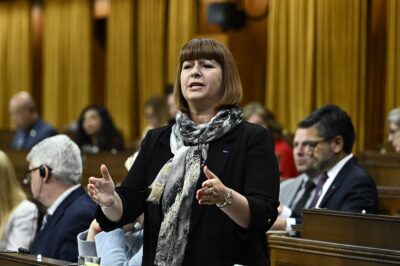Liberal MP says it’s time to stop the clock on daylight time
By Canadian Press on October 2, 2025.

OTTAWA — Liberal member of Parliament Marie-France Lalonde wants to call a halt to the annual ritual of springing forward and falling back.
The Ottawa-area MP plans to table a private member’s bill next week to end what she calls the “outdated practice” of daylight time.
“It is time to change the time change,” Lalonde told reporters Thursday. “This unnecessary barrier impacts the lives of Canadians in more ways than simply adjusting their clocks.”
The bill will call on the federal government to hold a pan-Canadian conference with provincial and territorial officials and Indigenous officials to formalize an agreement to end daylight time.
Lalonde cited the negative impacts of the twice annual time change, such as health issues and a spike in the number of vehicle accidents. She also said the practice impedes trade between provinces and with U.S. states.
“For over 117 years, we have simply followed this tradition, discussing it among ourselves at the dinner table, sharing how much this is meaningless or debating why it is we keep doing it,” Lalonde said. “Let’s stop speaking individually and start speaking collectively.”
Lalonde said Port Arthur in Ontario, now Thunder Bay, became the first municipality in the world to introduce daylight time in 1908. Since then, communities across Canada and around the world have adopted the practice.
The Canadian Encyclopedia says Ottawa officially introduced “daylight saving time” in 1918 as a measure to increase wartime production.
Dr. Rébecca Robillard, co-chair of the Canadian Sleep Research Consortium, told Thursday’s press conference the time change has clear impacts on health, safety and productivity.
“Research tells us that some groups of the population are more affected than others, for example, children, teenagers, seniors and people with chronic illnesses,” she said.
“I believe that our decisions around time change should be based on informed societal reflections as opposed to individual preferences. The scientific community is really keen to support these reflections.”
Time regulation falls under provincial and territorial jurisdiction, and most provinces and territories observe daylight time. Saskatchewan rarely has and passed legislation to make central standard time permanent in 1966.
The Yukon ditched daylight time in 2020, following a public consultation.
Lalonde said the issue is being studied by some other provinces, the United States and the European Union.
“As the Government of Canada focuses on building one economy that works for everyone by removing federal barriers, expediting nation building projects and making things more affordable, we must look at all avenues that could supplement the efforts,” said Lalonde.
She also introduced a bill to have the province of Ontario drop the time change when she was a member of the provincial parliament in 2019. A similar bill passed in Ontario the following year.
Conversations about dropping daylight time have been happening across the country for years.
The Ontario government passed legislation in 2020 to end the twice-yearly changing of clocks, making daylight time permanent — but only if Quebec and New York agreed to do the same.
In 2022, Atlantic Canada’s premiers decided to hold off on any move toward dropping the time change until they saw what neighbouring jurisdictions would do.
Peter Graefe, a political-science professor at McMaster University, told The Canadian Press that provinces have been wary of making changes that would create problems for businesses interacting with neighbouring provinces and states.
Another impediment, Graefe said, is that provinces need to decide whether to follow standard time or daylight time as an alternative.
Graefe said ending the shift from standard to daylight and back again could have negative impacts for some people, depending on how much they “enjoy having light at certain times of the day at certain times of the year.”
“A federal initiative to hold a conference or some sort of consultation on time change could help deal with the problem of coordination,” he said.
Clocks are set to go back by an hour at 2 a.m. on Sunday, Nov. 2, returning to standard time.
This report by The Canadian Press was first published Oct. 2, 2025.
Catherine Morrison, The Canadian Press
29-28




